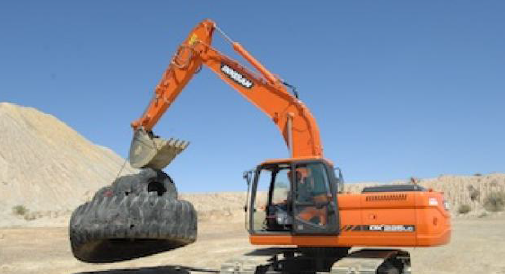OPERATOR DIES AFTER EXCAVATOR TIPS OVER THE SIDE OF A BRIDGE INTO RIVER
A 62-year-old equipment operator
was fatally injured when the hydraulic excavator he was operating tipped over
the side of a bridge, falling 60 feet into the river below. The operator was working on the demolition of
the bridge by removing cut concrete slabs from the bridge deck.
The employer is a construction company that primarily builds
and restores bridges. They are also involved in other construction work, including
erecting concrete and steel structures. They have been in business since 1964,
operate in six western states, and employ approximately 200 fulltime employees.
The employer also hires temporary equipment operators from the International
Union of Operating Engineers (IUOE) for specific projects.
He was using the hydraulic
excavator which was equipped with a type of bucket attachment (Slab Crab)
designed for bridge deck and concrete slab removal work. He was removing the
concrete slabs in order to position them for removal.
On the fatal lift, the concrete
slab was freely suspended from the Slab Crab with a two leg bridle chain sling.
In order to clear the guardrail, the operator extended the arm of the excavator
to raise the load.
This caused the load to exceed the
excavator’s load limit radius. The excavator became unbalanced and tipped
towards the edge of the bridge deck. The operator attempted to correct the
imbalance by arming-in, or decreasing the distance of the load from the
excavator.
However, arming in the load caused
the excavator to slide towards the edge of the bridge. The operator was trying
to get out of the cab when the excavator tipped over the edge of the bridge.
Workers immediately activated the
emergency response protocols. The operator was retrieved from the river in less
than 10 minutes and CPR was performed in the rescue boat. EMS arrived at the
scene within 15 minutes.
The operator was pronounced dead
at the hospital approximately 1½ hours after the excavator tipped over the
bridge.
To prevent similar incidents, our
investigators recommend that:
Employers:
• Plan excavator picks to ensure
that the stability of the machine can be maintained by the operator while
lifting freely suspended loads.
• Ensure that operators
participate in project and task pre-planning Job Hazard Analysis (JHA)
activities.
• Consider installing an audible
and/or visual load safety warning device or a safe load indicator to alert the
equipment operator before the object handling capacity or load moment is
reached.
Operators:
• Perform a JHA on any changes in
the intended work plan prior to changing the operational work plan.
• Communicate with riggers to
address any lift that does not follow the intended lifting plan.
ALWAYS REMEMBER:
WHEN AN EMPLOYEE IS KILLED
OR INJURED BY A PREVENTABLE WORKPLACE HAZARD, THIS IS NO ACCIDENT. IT MEANS THE EMPLOYER FAILED TO PROTECT
WORKERS FROM DANGERS THAT CAN CAUSE INJURY, ILLNESS OR, NEEDLESS DEATH





